Hello, Dear Reader
In the vast tapestry of Greek mythology, few figures shimmer with as much allure and mystery as the Muses. These divine sisters, daughters of Zeus and Mnemosyne (Memory), are the embodiment of inspiration.
Their names—Calliope, Clio, Erato, Euterpe, Melpomene, Polyhymnia, Terpsichore, Thalia, and Urania—resonate across centuries, whispering of poetry, music, dance, and the stars.
To understand them is to explore not only their mythological origins but also their profound symbolic meanings, and their enduring presence in our cultural imagination.
Let’s meet each Muse in turn and uncover the timeless wisdom they offer.
The Origins of the Muses
The Muses first emerge in Hesiod’s Theogony (c. 8th century BC), where they are described as nine goddesses born to Zeus, king of the gods, and Mnemosyne, the Titaness of memory.
For nine nights, Zeus and Mnemosyne made love, and from their love sprang these divine beings, destined to inspire mortals and immortals alike.
Hesiod, a poet himself, claimed the Muses appeared to him on Mount Helicon, gifting him the power of song and the staff of a poet. This encounter underscores their role as mediators between the divine and human.
The Muses were worshipped at sacred sites like Mount Helicon and Mount Parnassus, near the oracle of Delphi.
Springs such as Hippocrene, said to have been created by Pegasus’s hoof, were dedicated to them, symbolizing the flow of inspiration.
Their number, nine, was significant in Greek thought, representing completeness and harmony, a cosmic chord struck by the universe itself.
Yet, their roles evolved over time.
Early sources like Homer’s Iliad and Odyssey depict a single Muse or an unnamed group, while later traditions, solidified by Hesiod, assigned each a distinct domain.
The Muses are the guardians of human aspiration, embodying the drive to transcend the mundane through creation and understanding.
So, let’s now meet each Muse, exploring her domain and personality.
Calliope: The Muse of Epic Poetry
Domain: Epic poetry and eloquence
Symbols: Writing tablet, stylus, laurel wreath
Name Meaning: “Beautiful-voiced”
Calliope, the eldest and most revered of the Muses, presides over epic poetry—the grand narratives of gods, heroes, and the human condition. Her voice is said to be the most commanding, her presence regal.
In art, she is often depicted with a writing tablet or a scroll, her brow crowned with laurel, symbolizing victory and poetic mastery.
Calliope inspired works like Homer’s Iliad and Virgil’s Aeneid, epics that shaped civilizations.
Epic poetry was not mere entertainment in ancient Greece but a communal act, a way to preserve history and values. To invoke Calliope is to seek the courage to tell stories that matter—stories that define who we are and who we might become.
Clio: The Muse of History
Domain: History
Symbols: Scroll, books, trumpet
Name Meaning: “Proclaimer” or “to make famous”
Clio, the Muse of history, is the chronicler of human deeds. Often depicted with a scroll or a chest of books, she gazes thoughtfully, as if weighing the significance of each event. Her trumpet heralds the fame of heroes, but also the lessons of the past.
Clio’s role was vital in a culture that valued oral tradition, ensuring that the triumphs and failures of humanity were not forgotten.
Her connection to memory, through Mnemosyne, emphasizes that understanding the past is essential for navigating the future.
In ancient Greece, historians like Herodotus and Thucydides were thought to channel Clio’s inspiration, crafting accounts that blended fact, myth, and moral inquiry.
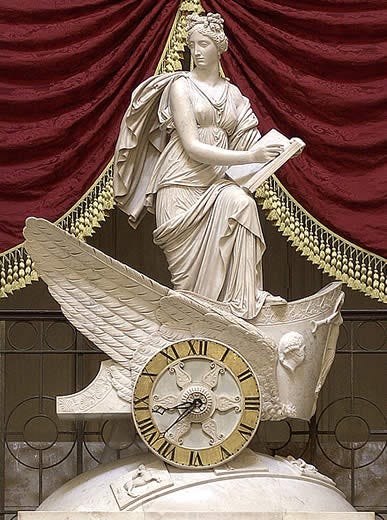
Erato: The Muse of Love Poetry
Domain: Love poetry and lyric poetry
Symbols: Lyre, roses, myrtle
Name Meaning: “Lovely” or “desired”
Erato, the Muse of love poetry, is the embodiment of passion and desire. With her lyre in hand and a wreath of roses adorning her hair, she inspires verses that capture the ecstasy and agony of love.
Poets like Sappho, whose fragments still burn with longing, were touched by Erato’s fire.
Erato’s power lies in her ability to distill the universal experience of love into words that resonate deeply.
Love, in her realm, is not only romantic but also familial, platonic, and divine. She reminds us that vulnerability is the root of connection, and that poetry—whether whispered to a lover or shouted to the heavens—can heal and transform.
Euterpe: The Muse of Music
Domain: Music and lyric poetry
Symbols: Flute (aulos), pipes
Name Meaning: “Giver of delight”
Euterpe, the Muse of music, is the soul of melody and harmony. Often depicted playing the aulos, a double-reed instrument, she brings joy and solace through sound.
In ancient Greece, music was inseparable from poetry and dance, and Euterpe’s influence extended to all forms of musical expression. Her gift is the ability to stir emotions that words alone cannot reach.
Music, for Euterpe, is a universal language. Her melodies could soothe the gods or rouse warriors to battle. She represents the intuitive, almost mystical power of music to heal, unite, and transcend.
In a world often divided, Euterpe’s song reminds us of our shared humanity.
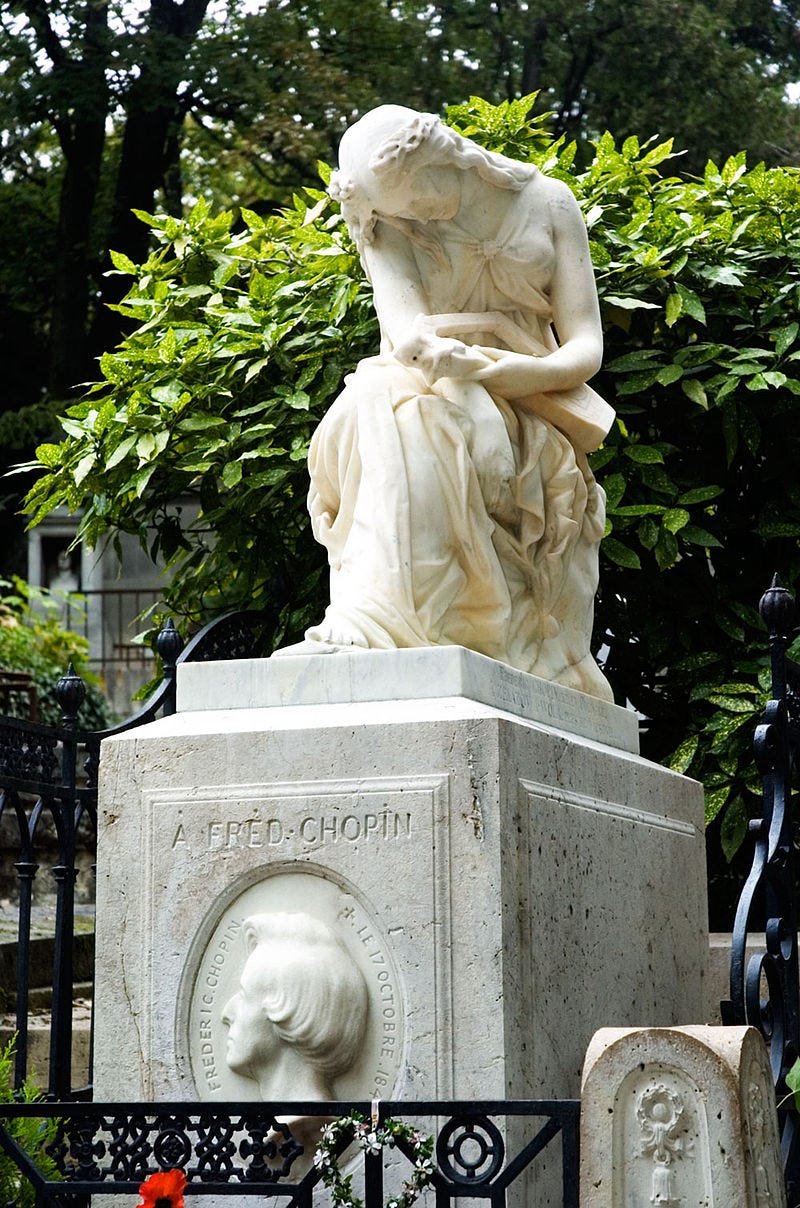
Melpomene: The Muse of Tragedy
Domain: Tragedy
Symbols: Tragic mask, cothurnus (boots), club
Name Meaning: “To sing” or “melodious one”
Melpomene, the Muse of tragedy, holds a mirror to the darker aspects of existence. With her tragic mask in one hand and a club or sword in the other, she presides over plays that explore suffering, fate, and redemption. In ancient Greece, tragedies like Sophocles’ Oedipus Rex and Euripides’ Medea were performed during festivals, offering catharsis to audiences through shared grief.
Melpomene’s power lies in her ability to transform pain into art. Tragedy, in her domain, is not despair but a profound confrontation with life’s fragility. She teaches us that suffering is universal, yet through storytelling, we can find meaning and resilience. Her presence is solemn but not without hope, for tragedy often carries the seeds of renewal.
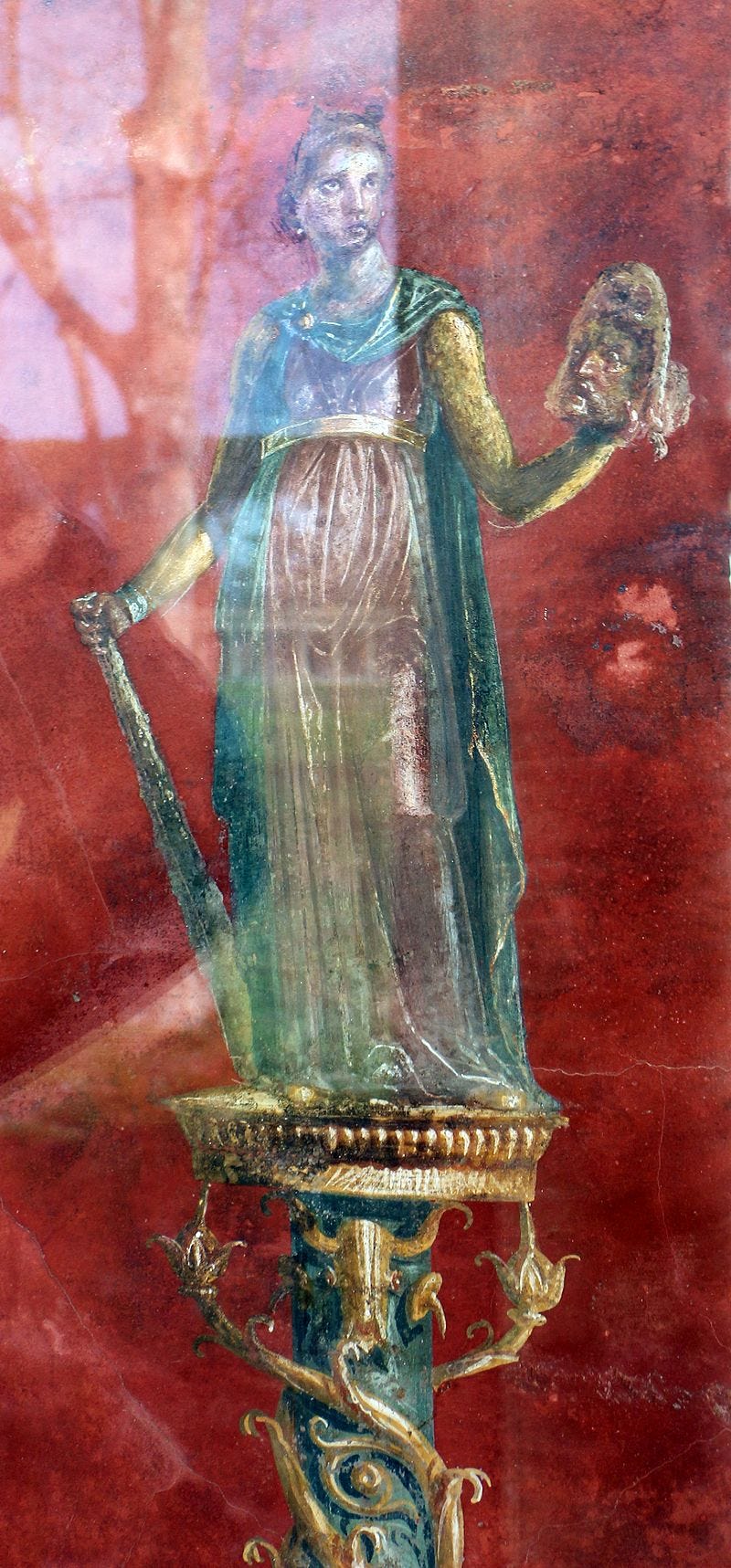
Cultural Canvas is a reader-supported publication. Every like, comment, share, and donation helps us grow—your support truly matters!
Polyhymnia: The Muse of Sacred Poetry
Domain: Sacred poetry, hymns, and meditation
Name Meaning: “Many hymns”
Symbols: Veil, grapes, pensive expression
Polyhymnia, the Muse of sacred poetry and hymns, embodies the divine connection between humanity and the cosmos. She is often depicted veiled suggesting mystery and contemplation. Her domain includes religious hymns, oratory, and even mime, reflecting her role in solemn, spiritual expression.
In ancient Greece, her influence was felt in hymns sung to Apollo or Athena, as well as in the quiet reverence of sacred spaces.
Polyhymnia’s gift is the ability to elevate the soul through words and gestures that honor the sacred. Her presence invites introspection, urging us to seek the divine in the stillness of our hearts and the beauty of ritual.
Terpsichore: The Muse of Dance
Domain: Dance and choral song
Name Meaning: “Delight in dancing”
Symbols: Lyre, dancing
Terpsichore, the Muse of dance, is joy incarnate, her movements a celebration of life’s rhythm. She is often depicted holding a lyre.
In ancient Greece, dance was a communal act, performed at weddings, festivals, and religious ceremonies, uniting people in shared motion.
Terpsichore’s domain is the harmony of body and soul, expressed through movement.
Her gift is the power of dance to transcend language, to tell stories through gesture, and to connect us with the pulse of existence.
Dance, for Terpsichore, is both discipline and freedom.
Thalia: The Muse of Comedy
Domain: Comedy and pastoral poetry
Name Meaning: “Blossoming” or “flourishing”
Symbols: Comic mask, shepherd’s staff, ivy wreath
Thalia, the Muse of comedy, is the gift of laughter. With her comic mask and ivy-crowned brow, she presides over plays that mock human folly and celebrate life’s absurdities.
In ancient Greece, comedies like those of Aristophanes poked fun at politicians and gods, offering relief and satire.
Thalia’s power lies in her ability to lighten hearts and challenge authority through humor.
Comedy, in her realm, is not frivolous but subversive—a way to question norms and find joy in imperfection.

Urania: The Muse of Astronomy
Domain: Astronomy and astrology
Name Meaning: “Heavenly”
Symbols: Globe, compass, starry cloak
Urania, the Muse of astronomy, gazes at the stars, her mind attuned to the cosmos. With a celestial globe in her hand, she inspires the study of the heavens.
In ancient Greece, astronomy was both science and poetry, a way to understand humanity’s place in the universe.
Urania guided philosophers like Ptolemy and poets who saw the stars as divine.
Her gift is the awe of the infinite, the drive to seek knowledge beyond the earthly.
She invites us to look upward, to question, and to dream of what lies beyond.
The Muses’ Enduring Legacy
The Muses are archetypes of the human spirit.
Their domains reflect the breadth of our aspirations, from the intimate to the cosmic.
In ancient Greece, they were invoked by artists and thinkers seeking divine guidance, but their essence transcends time and culture. They remind us that creativity is a sacred act, a collaboration between memory, imagination, and the divine spark within.
In the Renaissance, the Muses inspired artists like Botticelli and poets like Dante, who saw them as symbols of divine inspiration. Today, they live in every act of creation, from a scientist’s hypothesis to a dancer’s leap, from a historian’s archive to a comedian’s punchline.
The word “museum” derives from the Muses, a testament to their role as guardians of knowledge and beauty. Even “music” echoes their name, a reminder of their universal song.
The Muses also challenge us to reflect on our own sources of inspiration. What stirs your soul to create, to question, to dream?
Is it the epic scope of Calliope, the solemn truths of Melpomene, or the celestial wonder of Urania?
Perhaps it is all of them, harmonizing within you. Their message is clear: to live fully is to create, to seek meaning, and to share your gifts with the world.
To invoke the Muses is to open yourself to inspiration, to trust in the process of creation. Whether you write, sing, dance, or simply marvel at the stars, the Muses are with you, whispering:
Begin. Create. Become.
Missed our last story? Read it here!
Don’t miss the newest episode of our podcast!
Thank you for being part of Cultural Canvas! If you love what we do, consider supporting us to keep it free for everyone. Stay inspired and see you in the next post!


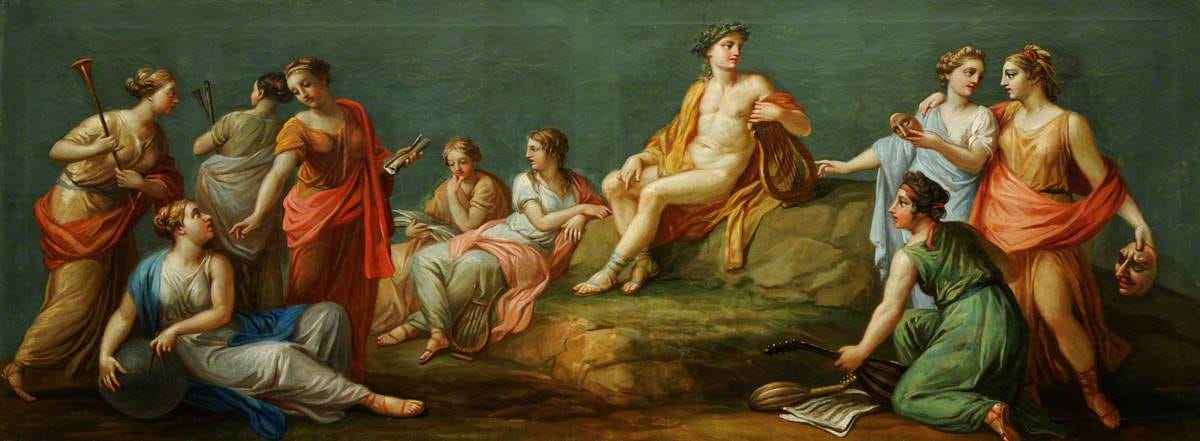

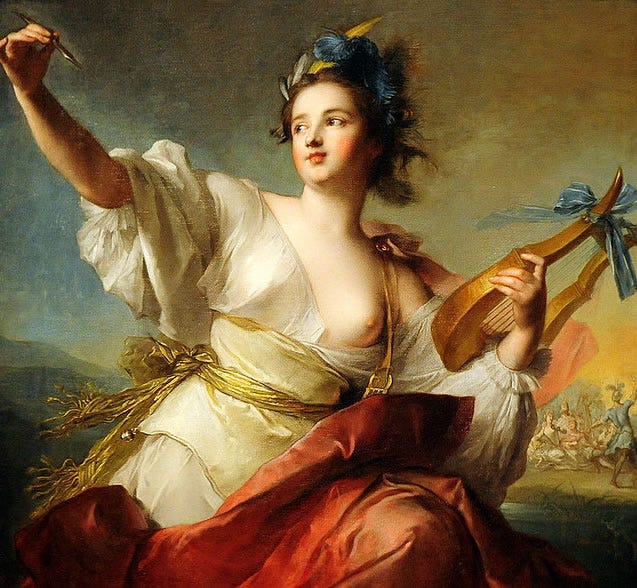
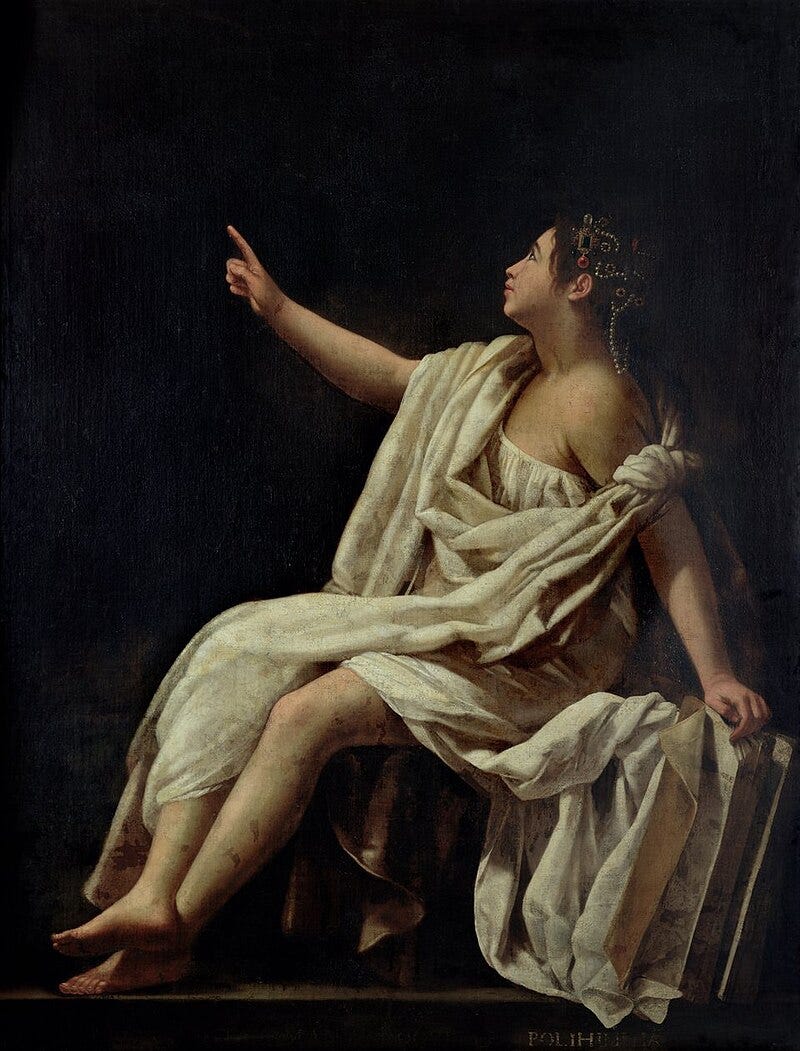

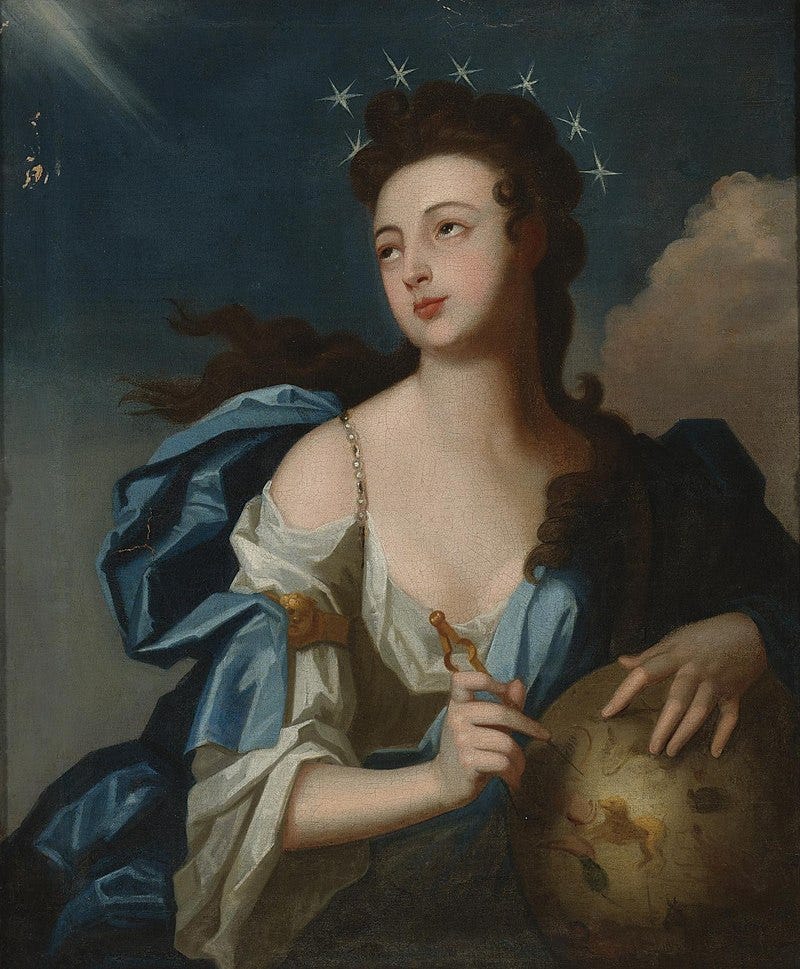


I SAY! I RESEMBLE THAT REMARK!
I want everyone to know I sneezed when he painted that fresco.
You’ve led this reader into the past, when Greek Mythology was a part of early education. Your writing makes me wonder why I didn’t pursue it further…
Your retelling of “The Muses,” is full of knowledge and a passion for mythology. I admire both greatly. Thank you for the writing and the sharing.